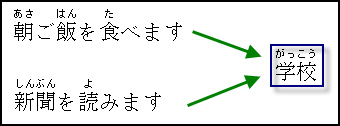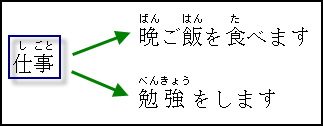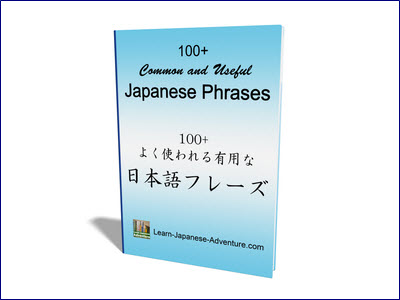- Home
- Basic Lessons
- Japanese Nouns Part 3
Japanese Nouns Part 3 -
Actions before and after Noun -
Free Japanese Lessons: 13
For topics on Japanese nouns, You have already learned how to form simple sentences using nouns and how to use one noun to modify another noun in lesson 2 and 3 respectively.
In this lesson I will concentrate on 2 simple sentence patterns that specify the actions perform before and after noun.
In Japanese, it's always useful to state that you are going to do certain actions before or after certain events.
These events are normally specified as Japanese nouns. And these nouns often involve certain actions.
Sentence Patterns
Let's check out the 2 sentence patterns...
Noun のまえに Verb (~ます)
Noun no mae ni Verb (~masu)
Meaning: Before Noun Verb (~masu)
Noun のあとで Verb (~ます)
Noun no ato de Verb (~masu)
Meaning: After Noun Verb (~masu)
One thing you have to take note is that the Noun in the above sentence patterns refer to only Japanese nouns that involve certain actions such as...
- あさごはん (asagohan) - Breakfast
- ひるごはん (hirugohan) - Lunch
- ばんごはん (bangohan) - Dinner
- べんきょう (benkyou) - Study
- そうじ (souji) - Cleaning
- せんたく (sentaku) - Do laundry
- がっこう (gakkou) - School
- しごと (shigoto) - Work
Action Before Japanese Noun
Let's say that you are going to eat your breakfast or read the newspaper before school.

Using the above scenarios, you can express them in the following...
- がっこう のまえに あさごはんをたべます。
gakkou no mae ni asagohan wo tabemasu
Meaning: I eat my breakfast before school.
- がっこう のまえに しんぶんをよみます。
gakkou no mae ni shinbun wo yomimasu
Meaning: I read the newspaper before school.
Action After Japanese Noun
In another case, let's say that you are going to eat your dinner or study after work.

Again using the above scenarios, you can express them in the following...
- しごと のあとで ばんごはんをたべます。
shigoto no ato de bangohan wo tabemasu
Meaning: I eat my dinner after work.
- しごと のあとで べんきょうをします。
shigoto no ato de benkyou wo shimasu
Meaning: I study after work.
More Examples on Actions Before and After Japanese Nouns

- あさごはん のまえに シャワーをあびます。
asagohan no mae ni shawa- wo abimasu
Meaning: I take a shower before breakfast. - あさごはん のまえに てをあらいます。
asagohan no mae ni te wo araimasu
Meaning: I wash my hand before breakfast.
- あさごはん のあとで がっこうへいきます。
asagohan no ato de gakkou e ikimasu
Meaning: I go to school after breakfast. - あさごはん のあとで テレビをみます。
asagohan no ato de terebi wo mimasu
Meaning: I watch tv after breakfast.

- おふろ のまえに テニスをします。
ofuro no mae ni tenisu wo shimasu
Meaning: I play tenis before taking a bath. - おふろ のまえに みずをのみます。
ofuro no mae ni mizu wo nomimasu
Meaning: I drink water before taking a bath.
- おふろ のあとで おんがくをききます。
ofuro no ato de ongaku wo kikimasu
Meaning: I listen to music after taking a bath. - おふろ のあとで ねます。
ofuro no ato de nemasu
Meaning: I go to bed after taking a bath.
Related Pages
Lesson 2: Nouns - Make simple sentences using Nouns.
Lesson 3: Nouns Part 2 - Using one noun to modify another noun.
Lesson 27: Noun Modifier.
Take The Challenge Sales! Get 45% OFF Premium & Premium PLUS! Ends on 16 Jan 2026
Click Here to Get 45% OFF Premium & Premium PLUS and be on the fast track to fluency in Japanese.
The link above is an affiliate link, which means that I would earn a commission (at no extra cost to you) if you do end up purchasing the related learning course.
Previous - Lesson 12: Japanese Time Duration
Buy me a coffee









Facebook Comments
Don’t see the comments box? Log in to your Facebook account, give Facebook consent, then return to this page and refresh it.